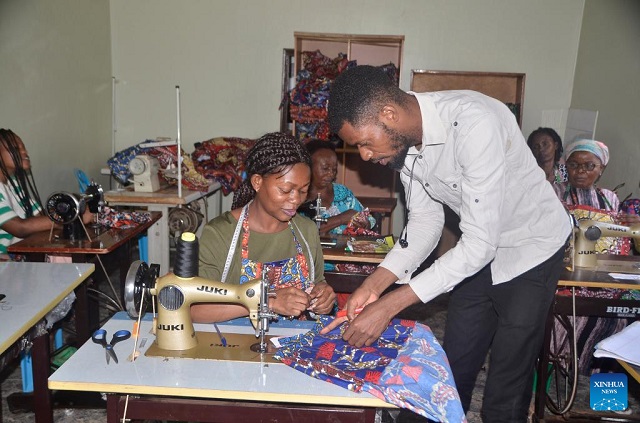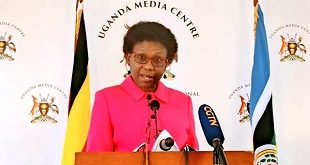
KAMPALA, Uganda | Xinhua | In the hustle and bustle of Kampala, the Ugandan capital, a group of Congolese refugee women are trying to fit in, hoping to heal from the war trauma they faced back home in the eastern Democratic Republic of the Congo (DRC), and stand on their own feet in a foreign country.
As the world marks World Refugee Day on June 20, Grace Kashama, 38, a Congolese refugee said in an interview with Xinhua in a crowded tailoring classroom in Makindye, a Kampala suburb, that she is keen on learning the skill so that she can open a tailoring shop someday in the future.
Kashama is part of a small group of 16 women, composed of Congolese and Somali refugees learning tailoring here at People for Peace and Defense of Rights (PPRD), a refugee-led non-governmental organization. Kashama’s group, named “Princess,” is part of a larger group of about 300 refugees acquiring various skills like art and craft making, music, fashion and design at PPRD.
“I decided to take on tailoring because I know in future it can take care of me and my children. When I start this (tailoring), even if I get little money, I can survive,” Kashama said. Kashama fled her hometown in Beni, a city in northeastern DRC after her husband was murdered in 2017.
Florence Mwavita Bitonde, 68, another Congolese refugee, is already out on the streets after acquiring skills in making arts and crafts. In a small house, living with her eight children, Bitonde uses her premises as a workshop.
Bitonde fled to Uganda in 2015, after rebels attacked her home in Rutshuru, leaving her husband dead.
Bitonde said that she has been making crafts for the past five years and has turned her life around. Every morning, Bitonde wakes up to make craft bags and hand-knitted scarves. With the help of her children, the bags are sold to neighboring communities.
she is now even passing on her craft-making skills to other refugee women and host communities.
Kashama and Bitonde are part of a group of about 5,000 refugee women who are skilled by PPRD to become self-reliant.


Joyeux Mugisho, the head of PPRD, said making the refugees active and engaging in income-generating activities helps them heal from the trauma that they faced back home. “We believe that trauma always comes back when people are suffering. When we give them these skills, it helps them focus on business and earning an income that is helping them take care of their children, (helping children) to go to school and have food,” Mugisho said.
PPRD is not alone in providing these skilling packages to refugees. In February this year, the UN World Food Program (WFP) in Uganda launched a 15-million-USD Self-Reliance Model targeting 100,000 refugees and host communities to progressively sustain themselves and reduce dependence on humanitarian assistance.
According to the food aid agency, as global funding of refugee programs dwindles and the increasingly unpredictable weather conditions, the Self-Reliance Model will support refugees and host communities to meet their own food needs by promoting income diversification and alternative livelihoods as well as digital financial inclusion.
Due to funding shortages, the WFP program reduced the food ratio given to the refugees. Only those in critical need are given food relief. Other refugees like Bitonde and Kashama stopped receiving food aid from the agency long time ago.
Uganda is host to more than 1.6 million refugees, making it one of the largest refugee-hosting countries in the world, according to the United Nations High Commissioner for Refugees. Most of the refugees come from neighboring South Sudan, DRC, Burundi, Rwanda, and Somalia among others.
Hilary Onek, Uganda’s minister for Relief, Disaster Preparedness and Refugee, said in February that as a country that hosts the highest number of refugees in Africa, there is a need for comprehensive development approaches that go beyond immediate humanitarian support. ■
 The Independent Uganda: You get the Truth we Pay the Price
The Independent Uganda: You get the Truth we Pay the Price



